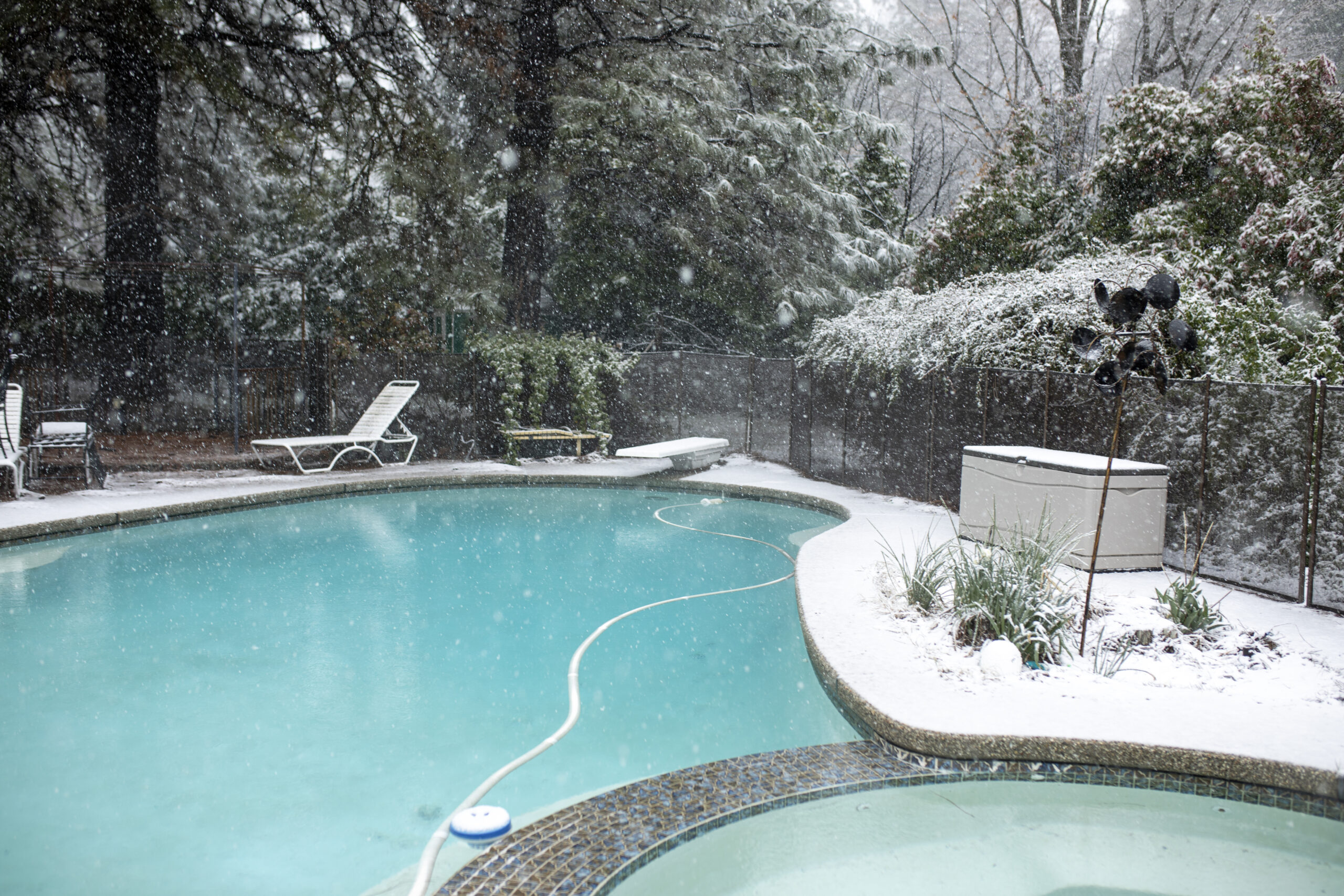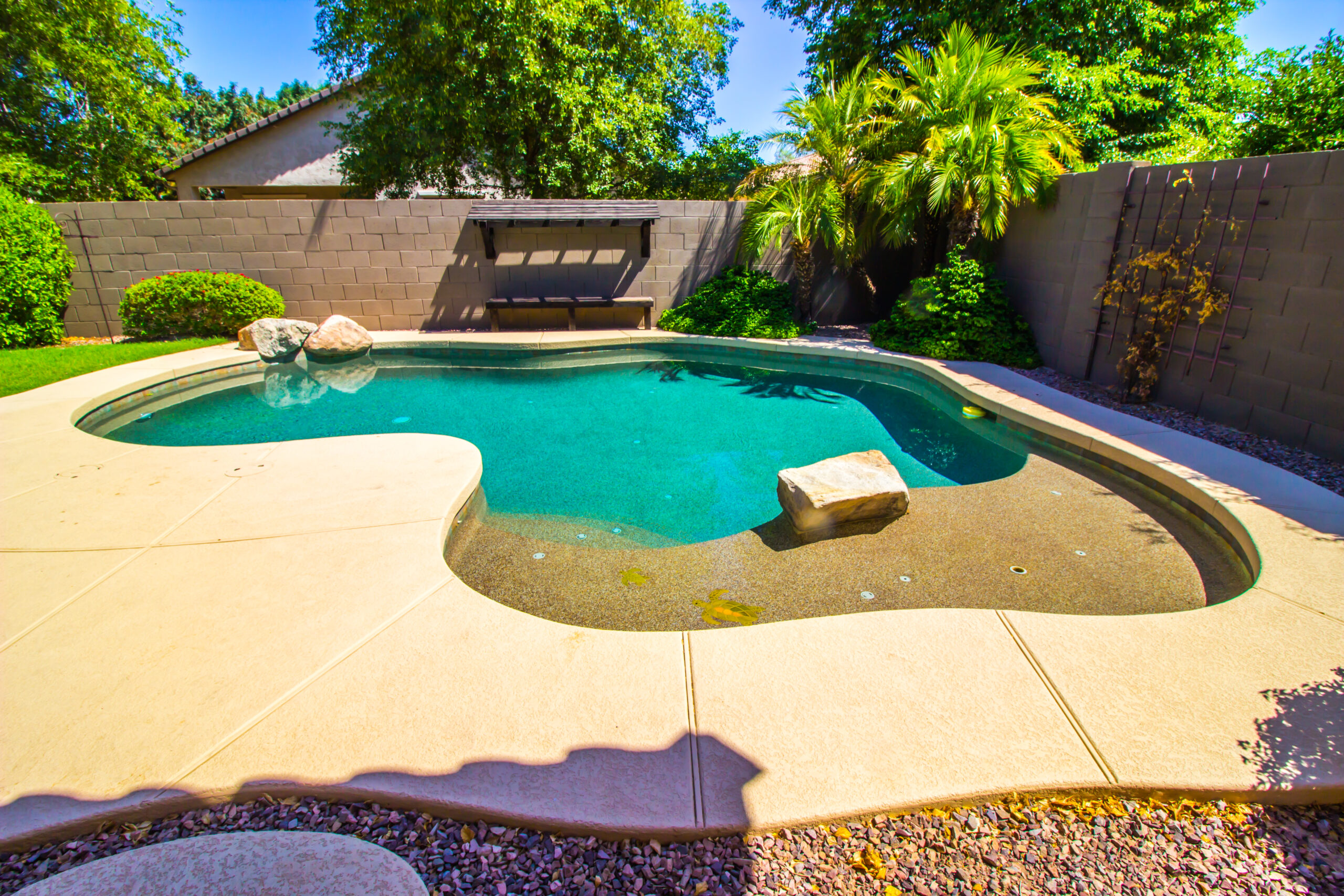You’re ready to dive into pool ownership, but don’t know where to start?
Choosing the right pool shape can be a game-changer. It’s not just about aesthetics; your choice impacts functionality, maintenance and cost too.
Don’t worry! We’ll guide you through this process, ensuring you make a splash with the perfect pool for your yard.
Understanding the Different Pool Shapes

You’ve got to understand the different pool shapes before you can make a decision that’s right for your yard. Each shape has its unique charm and functionality, influencing both pool aesthetics and safety considerations.
Rectangular pools, time-honored classics, are renowned for their elegant simplicity. Their linear design provides ample space for swimming laps or playing water games. If you’re a fitness enthusiast or have active kids, this might be your pick.
Next up are kidney-shaped pools. Mimicking a natural pond, they blend seamlessly with surrounding landscaping-perfect if you’re after an organic look. Their curved outline softens the overall aesthetic while offering safe zones for less confident swimmers.
Freeform pools let your imagination run wild. They can be designed to accommodate any yard shape or theme-whether it’s a tropical oasis or an alpine retreat. Though visually striking, ensure varying depths are clearly marked for safety.
L-shaped pools offer two distinct sections-one shallow and one deep-making them ideal if you need separate areas for children and adults.
Remember: when choosing your pool’s shape, consider not just how it’ll look but also how it’ll function day-to-day in terms of safety and usability.
Assessing Your Yard’s Space and Topography
It’s crucial to assess the space and topography of your outdoor area before making any decisions. This will guide you in choosing the right pool shape that fits perfectly with your yard.
Here are some landscaping considerations and safety measures to keep in mind:
1. Evaluate Your Space: Measure your backyard’s size, as it directly impacts the shape and size of the pool you can install. Don’t forget about room for a patio or deck!
2. Consider Topography: If your yard is hilly or sloped, it may require additional work but don’t worry; there are pool shapes designed for such landscapes.
3. Think About Landscaping: The existing plants, trees, and features around your yard will affect where you can place your pool and what shape it should be.
4. Prioritize Safety Measures: Make sure there’s enough space for fencing or other necessary safety precautions around the pool.
Remember, every yard is unique so what works for someone else might not work for you. Always consult with professionals if needed.
How Pool Shape Affects Functionality and Use
Consider how the shape of a swimming area can significantly impact its functionality and usage. A well-designed pool harmonizes with your yard’s landscape, complements your home’s architecture, and meets your specific needs for enjoyment, relaxation, or exercise.
Now let’s delve into pool safety considerations. If you’ve got young children or pets, you might want to opt for a pool shape that includes a shallow end or a ledge where they can play safely. Rounded corners also tend to be safer than sharp angles because they minimize the risk of injury from accidental bumps.
Decorative pool features are another key factor in determining your ideal pool shape. Perhaps you’re dreaming of an exotic lagoon-style oasis with rock formations and waterfalls? An irregular freeform shape will suit perfectly. Or maybe you envision an elegant Roman or Grecian pool adorned with statues and columns? Then go for a rectangular design with rounded edges.
Whatever style you choose, remember it’s not just about aesthetics but also about creating a user-friendly space that enhances your backyard experience while prioritizing safety. So take time to think through all these factors before making that final decision.
The Influence of Pool Shape on Maintenance and Costs
Let’s not forget that the shape of a swimming area can also influence maintenance efforts and overall costs. As you plan your dream pool, consider how design might affect practical considerations like upkeep and energy efficiency.
1. Cleaning time: A simple rectangular pool is often easier to clean than one with intricate curves or angles, meaning less time and money spent on maintenance.
2. Cover compatibility: Shape specific accessories such as covers can be more costly for irregularly shaped pools due to customization needs.
3. Energy efficiency implications: The surface area exposed to the sun directly affects heat absorption – a larger, more complex pool may require more energy to stay warm.
4. Equipment sizing: Irregular shapes may need larger or multiple pumps and filters, increasing upfront costs and running expenses.
Understanding these factors helps you make an informed choice about your pool’s shape. It’s not just about aesthetics; it’s also about long-term functionality and cost-effectiveness – because who doesn’t want a beautiful, easy-to-maintain swimming area?
Case Studies: Successful Pool Shape Selection in Different Yards
We’ll now delve into some real-life examples where homeowners successfully picked the perfect pool design for their unique yards. Considering both pool aesthetics and personal preferences, they’ve created backyard paradises that are worth exploring.
Take, for instance, a homeowner in Miami who had a narrow but long yard. The solution? A lap pool. It’s sleek and efficient in space usage while maintaining an inviting aesthetic. They chose a dark tile interior to create a dramatic contrast with the surrounding landscape; it’s an excellent demonstration of how personal preferences can drive distinctive aesthetics.
Then there’s the case of a family in Texas with plenty of yard space and children to entertain. For them, a free-form pool provided flexibility and fun. Natural stone borders coupled with integrated water slides made their backyard not only aesthetically pleasing but also kid-friendly.

Lastly, consider an artistic couple from California who opted for a figure-eight design. This allowed them to have two separate areas: one shallow end for lounging and one deeper area for swimming.
Each example underscores the importance of tailoring your choice of pool shape to your specific needs and desires – because your backyard should be more than just appealing… it should be uniquely you!
Frequently Asked Questions
What Type of Pool Materials Are Best for Different Pool Shapes?
Considering your pool’s shape, you’ll need to evaluate material durability and cost efficiency. Rectangular pools often use concrete for long-lasting strength, while kidney or free-form shapes might benefit from cheaper, flexible vinyl liners.
How Can the Pool Shape Affect the Safety of Swimmers?
The pool’s shape can significantly impact swimmer safety. Sharp corners might pose hazards. A rounded, open shape allows for enhanced supervision techniques and underscores swimming lessons’ importance in preventing accidents. Choose wisely!
What Are Some of the Latest Trends in Pool Shapes and Designs?
You’re seeing a rise in geometric pool shapes, infinity edges, and integrated lighting trends. Landscaping is also key, with pools blending seamlessly into the surrounding greenery for a natural, luxurious look.
What Are the Pros and Cons of Choosing a Custom Pool Shape Versus a Pre-Set Design?
Choosing a custom pool shape allows personalization but might strain your budget and increase maintenance requirements. Pre-set designs are cost-effective with standard upkeep, yet they don’t offer unique aesthetic value like custom shapes do.
How Long Does It Usually Take to Install Different Shapes of Pools?
Pool installation timelines vary greatly. They’re often shape dependent, with complex designs taking longer. Standard shapes might take 6-8 weeks, while custom could stretch beyond that. It’s crucial to factor this into your planning.
